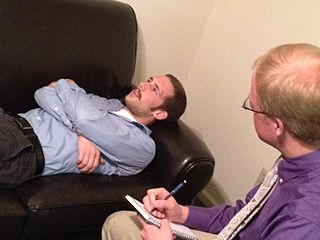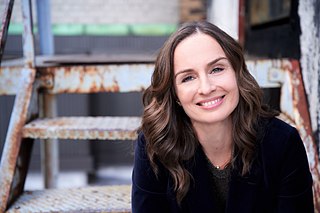Psychology is the scientific study of mind and behavior. Its subject matter includes the behavior of humans and nonhumans, both conscious and unconscious phenomena, and mental processes such as thoughts, feelings, and motives. Psychology is an academic discipline of immense scope, crossing the boundaries between the natural and social sciences. Biological psychologists seek an understanding of the emergent properties of brains, linking the discipline to neuroscience. As social scientists, psychologists aim to understand the behavior of individuals and groups.
Marsha M. Linehan is an American psychologist and author. She is the creator of dialectical behavior therapy (DBT), a type of psychotherapy that combines cognitive restructuring with acceptance, mindfulness, and shaping.

In applied psychology, interventions are actions performed to bring about change in people. A wide range of intervention strategies exist and they are directed towards various types of issues. Most generally, it means any activities used to modify behavior, emotional state, or feelings. Psychological interventions have many different applications and the most common use is for the treatment of mental disorders, most commonly using psychotherapy. The ultimate goal behind these interventions is not only to alleviate symptoms but also to target the root cause of mental disorders.
Stanley Jack Rachman was a South African-born psychologist who worked primarily with obsessive-compulsive disorder (OCD) and other anxiety disorders. He spent much of his career based in the UK and Canada.

Cognitive bias modification (CBM) refers to procedures used in psychology that aim to directly change biases in cognitive processes, such as biased attention toward threat stimuli and biased interpretation of ambiguous stimuli as threatening. The procedures are designed to modify information processing via cognitive tasks that use basic learning principles and repeated practice to encourage a healthier thinking style in line with the training contingency.
David Millar Clark, is a British psychologist.

Richard McNally is an American psychologist and director of clinical training at Harvard University's department of psychology. As a clinical psychologist and experimental psycho-pathologist, McNally studies anxiety disorders and related syndromes, such as post-traumatic stress disorder, obsessive–compulsive disorder, and complicated grief.
Susan Hilary SpenceAO is an Australian scientist whose work in clinical psychology is focussed on the causes, assessment, prevention and treatment of depression and anxiety in young people. Throughout the course of her career she has remained consistently at the forefront of this research area, has published widely and has been a regular recipient of national competitive grant funding.

Andri Steinþór Björnsson is a clinical psychologist and an associate professor of psychology at the University of Iceland. In addition to his work on body dysmorphic syndrome, he has hosted a series of radio programs on science and the scientific method broadcast by RÚV, as well as editing and writing books on science aimed at the general public.
Jonathan S. Comer. is an American psychologist who is a Professor of Psychology and Psychiatry at Florida International University. He is currently the director of an interdisciplinary clinical research program called the Mental health Interventions and Novel Therapeutics (MINT) Program. The MINT program focuses on improving the quality, scope, and accessibility of mental health care. Comer also serves as director of the Network for Enhancing Wellness in Disaster-Affected Youth, a SAMHSA-funded program in the National Child Traumatic Stress Network (NCTSN) that provides trauma-informed training and consultation to youth-serving professionals in disaster-prone and disaster-hit regions. Comer is a Fellow of the American Psychological Association and a leader in the field of clinical child and adolescent psychology. The author of over 250 scientific papers and chapters, he has received early career awards from the American Psychological Association, the Association for Psychological Science, and the Association for Behavioral and Cognitive Therapies for his work. His research has been funded by federal agencies and by several private foundations and non-profit organizations. He has also received funding from the Andrew Kukes Foundation for Social Anxiety.

David H. Barlow is an American psychologist and Professor Emeritus of Psychology and Psychiatry at Boston University. He is board certified by the American Board of Professional Psychology. Barlow is known for his research and publications on the etiology, nature, and treatment of anxiety disorders. The models and treatment methods that he developed for anxiety and related disorders are widely used in clinical training and practice. Barlow is one of the most frequently cited psychologists in the world.
Philip C. Kendall is Distinguished University Professor and Laura H. Carnell Professor of Psychology, Director of the Child and Adolescent Anxiety Disorders Clinic at Temple University, and clinical child and adolescent psychologist. Alongside contemporaries at Temple University, Kendall produced the Coping Cat program. Coping Cat is an evidence-based and empirically supported treatment for anxiety in youth.

Emily A. Holmes is a clinical psychologist and neuroscientist known for her research on mental imagery in relation to psychological treatments for post traumatic stress disorder (PTSD), bipolar disorder, and depression. Holmes is Professor at the department of Women's and Children's Health at Uppsala University. She also holds an appointment as Honorary Professor of Clinical Psychology at the University of Oxford.
Anne Marie Albano is a clinical psychologist known for her clinical work and research on psychosocial treatments for anxiety and mood disorders, and the impact of these disorders on the developing youth. She is the CUCARD professor of medical psychology in psychiatry at Columbia University, the founding director of the Columbia University Clinic for Anxiety and Related Disorders (CUCARD), and the clinical site director at CUCARD of the New York Presbyterian Hospital's Youth Anxiety Center.
Elaine Fox is a Professor of Psychology and Director of the Oxford Centre for Emotions and Affective Neuroscience (OCEAN) at the University of Oxford. Her research considers the science of emotion and what makes some people more resilient than others. As of 2019 Fox serves as the Mental Health Networks Impact and Engagement Coordinator for United Kingdom Research and Innovation.
J. Gayle Beck is a licensed clinical psychologist who specializes in trauma stress disorders and anxiety disorders. She is the Lillian and Morrie Moss Chair of Excellence in the Department of Psychology at the University of Memphis.
Keith Stephen Dobson is a Canadian psychologist, academic, and researcher. With a long career at the University of Calgary in Canada, he now holds the title of Professor Emeritus, having served as a tenured Professor, Head of the Psychology Department, and Director of the Clinical Psychology program at the university.

Tracy Dennis-Tiwary is an American clinical psychologist, author, health technology entrepreneur, and professor of psychology and neuroscience at Hunter College and the Graduate Center of The City University of New York. Her research explores emotion regulation and its role in mental health and illness, with a particular focus on anxiety and anxiety-related attention biases, as well as child emotional development.
Debra A. Hope, Ph.D., specializes in clinical psychology, anxiety disorders, social anxiety, and developmental psychology. She conducts research in two main areas: 1) evaluating and treating anxiety disorders, with a particular emphasis on social anxiety disorders, and 2) examining how stigma affects the mental health and healthcare experiences of marginalized individuals within the transgender, lesbian, gay, or bisexual communities. Hope is a professor of psychology at University of Nebraska - Lincoln as well as holding the position of associate vice chancellor and dean of graduate education.






